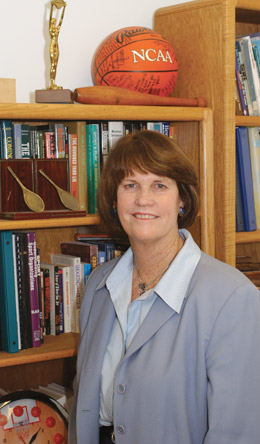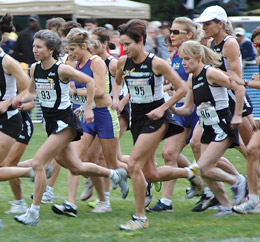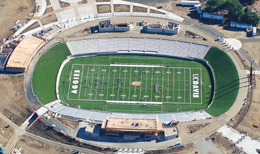Volume 24 · Number 3 · Spring 2007
Sports

Pam Gill-Fisher (Photo: Jim Von Rummelhoff/UC Davis)
The Close of a 28-Year Career
A retiring administrator leaves a legacy of commitment to all student athletes.
As women’s basketball coach at UC Davis, Pam Gill-Fisher was used to teaching her players to share the ball for the betterment of the team. Now stepping down after 28 years as an athletics administrator, she’s quick to use the same philosophy when describing her role in an intercoegiate athletics program that has enjoyed immense success during her tenure and is on the threshold of a new life as an NCAA Division I institution.
“I’m proud to have been a part of this, and if my role in this was to help move it in a positive direction, then I feel good,” said Gill-Fisher ’71, Cred. ’72, M.A. ’75. “I, by no means, think that my contribution was any bigger than anyone else’s. I just feel like we’ve all worked hard for this.”
Gill-Fisher shared that perspective after stepping aside in December as senior associate athletics director to return to her faculty appointment. She will teach a physical education class titled “Sports in American Society” and in the future, she hopes, a class in leadership. Administratively, she has overseen compliance, student services and sports medicine programs, and has supervised eight sports, impacting thousands of student-athletes.
It’s the next step in a distinguished tenure on campus that began in 1967 as a five-sport student-athlete, continued through a coaching career that was highlighted by a women’s tennis national championship in 1990, and has included teaching and administrative service.
Gill-Fisher, an inductee into the Cal Aggie Athletic Hall of Fame, has also served as the athletics program’s NCAA Senior Woman Administrator, a role that benefited from her dedication to the tenets of Title IX, a law prohibiting sexual discrimination in educational programs and activities that receive federal funding. The law, most visibly applied to athletics, was enacted in 1972—too late for her to benefit as a student-athlete but just in time for her to help make a difference for future Aggie generations.
Furthering efforts launched by her mentor Marya Welch—who started women’s athletics on campus more than 50 years ago—Gill-Fisher was instrumental in helping form the foundation of an athletics program highlighted by distinguished achievement by its women’s teams. Among them have been three NCAA Woman of the Year Awards—more than any other institution in the country; the women’s program also contributed significantly to UC Davis’ receipt of six Directors’ Cups, honoring the nation’s most successful Division II athletics program.
But she’s quick to share credit for UC Davis’ commitment to gender equity, pointing to the role of former administrators an
lld colleagues, including Welch, Chancellor Larry Vanderhoef, former Chancellor Emil Mrak, former Athletics Director Joe Singleton and countless coaches, both at UC Davis and elsewhere.
Gill-Fisher, who has served on numerous NCAA committees and is former president of the National Association of Collegiate Women Athletic Administrators, said achieving gender equity is not easy but important and that UC Davis has been committed from the beginning.
“I’m really proud to have been a part of this and to have been a part of something that I so firmly believe in philosophically,” she said. “And proud that we did it the right way.”

Photo: Keith Williams
A reunion in racing spikes
Alumni from the past two decades of UC Davis cross country teams came together and raced again in December at the USA Track & Field National Club Cross County Championships, and the Aggie women’s 40-and-over team came away first-place winners. The winning team included Linda Somers Smith ’83, J.D. ’86 (number 95)—who also finished first overall to take the individual title—and Patti Gray Bellan ’84, M.A. ’87 (number 93). Another Aggie over-40 team that included Nancy Riedel Steinmaus ’86, M.A. ’89 (in white hat) took fifth. Not shown but also racing in the over-40 women’s 6K were Jill Perry Strangio ’86, Cred. ’88, and Francie Negri ’92. Some 40 alumni answered the call of longtime cross country coach Sue Williams to race again. “The race was amazing,” said Williams, noting the quality of the racers (including Olympian Smith and school record-holder Bellan), the competitiveness of the field and “the team spirit that kicked in among the former Aggies almost automatically.”

Photo: Rand Schaal
Bird's eye view
Aggie Stadium, shown here during construction in November, will host its first-ever football game on Sept. 1 when UC Davis faces Western Washington in the first of five home matchups. The multiuse stadium, which will also be home to the women’s lacrosse team, will also see visits from Northeastern University (Sept. 22), Cal Poly (Oct. 13), South Dakota State (Oct. 27, Homecoming) and the University of San Diego (Nov. 17).
Wrestling suit settled
A longstanding lawsuit brought against UC Davis and its athletics administrators by the campus’s former head wrestling coach was settled in January.
Michael Burch had claimed the campus did not renew his coaching contract in 2001 in retaliation for his support of UC Davis women wrestlers and their gender discrimination complaint—a complaint ultimately dismissed by the U.S. Department of Education’s Office for Civil Rights.
In settling the case, the university maintains that it acted appropriately in all matters related to Burch’s departure and to the participation of women in the campus’s varsity wrestling program. The university’s $725,000 settlement was reached after extensive negotiations moderated by U.S. District Judge William Shubb. The amount is based primarily on the potential exposure to the campus due to costly litigation of more than three years that included claims by Burch’s attorneys for expenses and fees well above the settlement amount.
Burch had alleged under Title IX that the university did not renew his coaching contract for the 2001–2002 season to retaliate against him for advocating the interests of women wrestlers. His second claim, which was brought against the individual defendants, had alleged they retaliated against him for engaging in free or protected speech relating to women’s wrestling. The university and the individuals who were sued denied any such motivation or wrongdoing. There is no admission of liability in the settlement.
Before and during the years that Burch was the head wrestling coach, women’s wrestling had an unofficial status on campus. During Burch’s term, female student-athletes were not required to compete for a spot on the varsity roster. The few women who participated in wrestling under Burch’s leadership never participated in a dual meet or competed for UC Davis. As part of the campus roster management program, the size of the wrestling team was limited to 34 spots for the 2000–2001 season. Burch did not allot any of those spots to women.
A fact sheet on the case and UC Davis athletics can be found on the Web here.
High marks for athletes
In a National Collegiate Athletic Association study that looked at how athletes fared, not on the field, but in the classroom, UC Davis student-athletes bested the competition both nationally and among the general student population on campus.
In a comparison of graduation rates of Division II student-athletes and student populations in general, data showed that UC Davis student-athletes matriculated at 89 percent under federal guidelines and 93 percent using the NCAA’s Graduation Success Rate formula. Both figures are well above the national averages for Division II student-athletes (55 percent with the federal formula/69 percent with NCAA formula) and also higher than overall student populations nationally (46 percent/no NCAA figure) and at UC Davis (80 percent/no NCAA figure).
The data measured student-athletes who graduated within six years after beginning their college education as freshmen during the 1999–2000 academic year.
“Our student-athletes’ academic achievements are truly exceptional, especially given their demanding practice and competition schedules,” said Michelle Roppeau, director of athletics academic advising. “With multiple Dean’s List honorees and 40–50 percent of our student-athletes earning a 3.00-plus G.P.A. each quarter, it’s clear that we have attracted the best and the brightest.”
UC Davis is currently finishing its reclassification from Division II to Division I with competition at its new level scheduled to begin in the fall.
